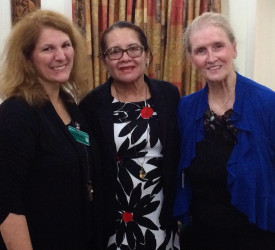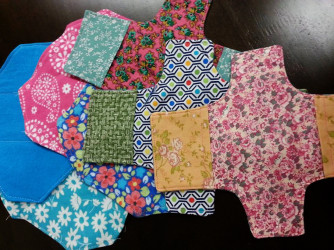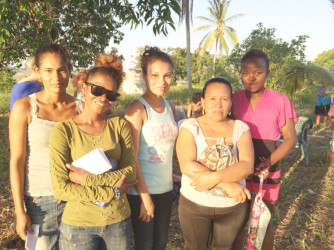By Jamal aGoodluck
While most persons are bashful about the topic of the menstrual cycle, Celeste Mergens takes every opportunity to break the taboo as well as sharing her life’s passion of providing sustainable tri-fold pads that are healthy and affordable.
She birthed the Days for Girls (DfG) in 2008 and provides educational for-ums for girls on their bodies, but the most revolutionary aspect of the organisation is providing the washable pad.

A congregation of 50 women spanning multiple generations sat on make-shift benches under a tree at Waiakabra to engage in conversations on their bodies, which was facilitated by Mergens.
The chuckles, bashful smiles and coy looks were mixed with deep meaningful conversation on menstrual cycle, their bodies, pregnancy, sex and hy-giene. Mergens lamented, “Without periods there would be no people. Do not be ashamed of being a woman. We need to be willing to be open and stand together.”
Five per cent of the women indicated that they do not track their monthly cycle; 95% of them were willing to try the sustainable pads. Several young ladies signed up to be ambassadors for women health.
Mergens was accompanied by Miriam Lancaster who volunteers with DfG. She jumped at the opportunity to return to Guyana and make an impact on lives of women. During 1957 and 1958 her father, Dr Russell Smith, who worked with Davis Memorial Hospital and was posted in Region 7. Lancaster was close to her father. She said that among his last words were: “Wish we were in BG [British Guiana].” She subsequently returned in 1998 and through DfG she got the opportunity to make a difference in the land that he loved.
Lancaster explained that the product is environmentally friendly as opposed to a disposable pad that takes 700 years to degrade. The programme also incorporates an entrepreneurship aspect to it and seeks to empower women financially. She explained that one would not be able to get rich from the imitative but would be able to meet their health and hygiene needs. They are currently seeking to partner with a local group to produce washable pads that can be distributed locally as well as abroad.
In the introduction, many girls perceived the washable pad in a purse form which speaks to the innovated design which landed DfG a spot on Stanford Social Innovation Review. In her piece for the review Mergens writes, “Washable pads may not seem like a big deal. Yet they can make a big impact. They allow women and girls to reclaim the most valuable commodity that they have: time.”

The goal is to ensure that women and girls in all parts of the world have access to a feminine hygiene solution that they can count on, month after month. The tagline “Every girl. Everywhere. Period.” sums up the drive these women have about the health and well-being of women who might have to choose between hygiene and food. One of the washable pads can last between 2 to 3 years and they have been developed for comfort and safety.
Mergens gives credit to the many women who contributed to the improvement of the design. She posited that providing an effective feminine hygiene solution can directly affect outcomes for women and girls in the areas of education, health and social and economic participation.
The DfG representatives said they were fortunate and grateful to work with a few dedicated local persons who made their one week here productive. They met with First Lady Sandra Granger, visited schools in Bartica and Linden as well as the Ministry of Indigenous Affairs to construct a way of implementing the programme.

Chairman Anita Kunes expressed to the girls, “Your body is not a modern thing” as she explained the need for parents to observe the changes in the bodies of their children and talk to them. She said the talk was useful. “We need to enlighten these ladies,” she added.
Onika Jacobs who signed as a DfG Ambassador for Health cheerfully stated, “I feel good about today’s conversation. I never had a training like this. I want to be a trainer and I am looking forward to sharing with other women like myself.”
Althea shared her story of her grandmother who had used washable pads but said she was reluctant to use it because often times it got discoloured and unappealing. However, she is willing to try the ones given by the DfG because they have wings and are brightly coloured.
Mergens closed the session with self-defence pointers and gave the ladies encouraging words along with advice to be safe.
This was the first distribution in Guyana, bringing the reach of the non-profit organisation to 87 countries on six continents. DfG has been featured on TEDx, O Magazine and has been making a difference in the lives of women all over the world.









